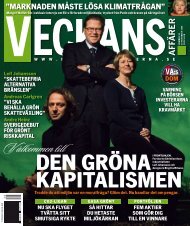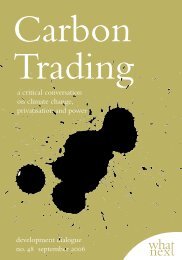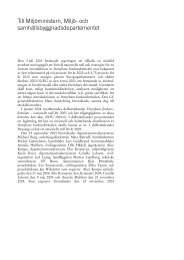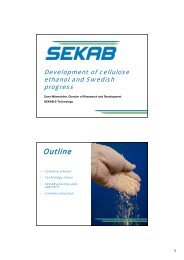Sugarcane ethanol: Contributions to climate change - BAFF
Sugarcane ethanol: Contributions to climate change - BAFF
Sugarcane ethanol: Contributions to climate change - BAFF
Create successful ePaper yourself
Turn your PDF publications into a flip-book with our unique Google optimized e-Paper software.
4.2. Greenhouse gas balances<br />
Biofuel conversion technologies<br />
�e net emissions over the full life cycle of biofuels – from <strong>change</strong>s in land use <strong>to</strong> combustion<br />
of fuels – that determine their impact on the <strong>climate</strong>. Research on net emissions is far<br />
from conclusive, and estimates vary widely. Calculations of net GHG emissions are highly<br />
sensitive <strong>to</strong> assumptions about system boundaries and key parameter values – for example,<br />
land use <strong>change</strong>s and their impacts, which inputs are included, such as energy embedded<br />
in agricultural machinery and how various fac<strong>to</strong>rs are weighted.<br />
�e primary reasons for di�ering results are di�erent assumptions made about cultivation,<br />
and conversion or valuation of co-products. (Larson, 2005), who reviewed multiple studies,<br />
found that the greatest variations in results arose from the allocation method chosen for<br />
co-products, and assumptions about N 2 O emissions and soil carbon dynamics. In addition,<br />
GHG savings will vary from place <strong>to</strong> place – according <strong>to</strong> existing incentives for GHG<br />
reductions, for example. And the advantages of a few biofuels (e.g. sugarcane <strong>ethanol</strong> in<br />
Brazil) are location speci�c. As a result, it is di�cult <strong>to</strong> compare across studies; however,<br />
despite these challenges, some of the more important studies point <strong>to</strong> several useful<br />
conclusions.<br />
�is analysis notwithstanding, the vast majority of studies have found that, even when all<br />
fossil fuel inputs throughout the life cycle are accounted for, producing and using biofuels<br />
made from current feeds<strong>to</strong>ck result in substantial reductions in GHG emissions relative <strong>to</strong><br />
petroleum fuels.<br />
In general, of all potential feeds<strong>to</strong>ck options, producing <strong>ethanol</strong> from maize results in<br />
the smallest decrease in overall emissions. �e greatest bene�t, meanwhile, comes from<br />
<strong>ethanol</strong> produced from sugarcane grown in Brazil (or from using cellulose or wood waste<br />
as feeds<strong>to</strong>ck). Several studies have assessed the net emissions reductions resulting from<br />
sugarcane <strong>ethanol</strong> in Brazil, and all have concluded that the bene�ts far exceed those from<br />
grain-based <strong>ethanol</strong> produced in Europe and the United States.<br />
Ful<strong>to</strong>n (2004) attributes the lower life-cycle <strong>climate</strong> impacts of Brazilian sugarcane <strong>ethanol</strong><br />
<strong>to</strong> two major fac<strong>to</strong>rs: First, cane yields are high and require relatively low inputs of fertilizer,<br />
since Brazil has better solar resources and high soil productivity. Second, almost all<br />
conversion plants use bagasse (the residue that remains a�er pressing the sugar juice from<br />
the cane stalk) for energy, and many recent plants use co-generation (heat and electricity),<br />
enabling them <strong>to</strong> feed electricity in<strong>to</strong> the grid. As such, net fossil energy requirements are<br />
near zero, and in some cases could be below zero. (In addition, less energy is required for<br />
processing because there is no need for the extra step <strong>to</strong> break down starch in<strong>to</strong> simple<br />
sugars. Because most process energy in Brazil is already renewable, this does not really<br />
play a role.)<br />
<strong>Sugarcane</strong> <strong>ethanol</strong> 173












